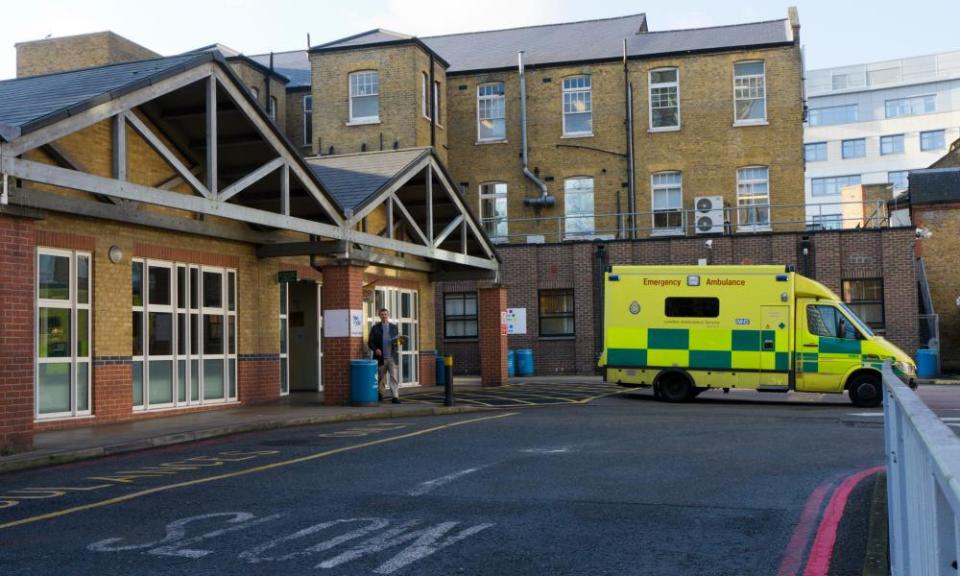London coronavirus patient turned up at hospital in Uber taxi

The first person diagnosed with coronavirus in London turned up unannounced at a hospital in an Uber taxi after falling ill.
Two staff from Lewisham hospital in south London are now in isolation at home after coming into contact with the woman, a Chinese national who had recently arrived in the city from China.
Lewisham hospital on Thursday confirmed the unnamed patient had not followed public health officials’ advice and had simply “self-presented” at its A&E unit on Sunday afternoon.
She did not arrive by ambulance or her own private vehicle and went straight to the A&E reception desk to report her symptoms – both clear breaches of guidance aimed at stopping the spread of the virus.
No other patients were exposed to the risk of infection by the manner of her arrival, the hospital said.
The woman was then sent home pending the results of her tests. On Wednesday she was taken to another London hospital, St Thomas’, for treatment.
The World Health Organization is recommending that people take simple precautions to reduce exposure to and transmission of the Wuhan coronavirus, for which there is no specific cure or vaccine.
The UN agency advises people to:
Frequently wash their hands with an alcohol-based hand rub or warm water and soap
Cover their mouth and nose with a flexed elbow or tissue when sneezing or coughing
Avoid close contact with anyone who has a fever or cough
Seek early medical help if they have a fever, cough and difficulty breathing, and share their travel history with healthcare providers
Avoid direct, unprotected contact with live animals and surfaces in contact with animals when visiting live markets in affected areas
Avoid eating raw or undercooked animal products and exercise care when handling raw meat, milk or animal organs to avoid cross-contamination with uncooked foods.
Despite a surge in sales of face masks in the aftermath of the outbreak of the coronavirus outbreak, experts are divided over whether they can prevent transmission and infection. There is some evidence to suggest that masks can help prevent hand-to-mouth transmissions, given the large number of times people touch their faces. The consensus appears to be that wearing a mask can limit – but not eliminate – the risks, provided they are used correctly.
The Foreign and Commonwealth Office has advised UK nationals to leave China where possible. It is also warning that travellers from Hong Kong, Japan, Macau, Malaysia, Republic of Korea, Singapore, Taiwan and Thailand who develop symptoms of cough or fever or shortness of breath within 14 days of returning the UK should contact the NHS by phone.
In a message to staff, Ben Travis, the chief executive of the Lewisham and Greenwich NHS trust, said: “We wanted to let you know that we have had a confirmed case of coronavirus from a patient who self-presented at the A&E department of University hospital Lewisham (UHL) last Sunday (9 February).
“The test result was confirmed as positive yesterday (Wednesday 12 February) and we have been in touch with all staff who came into contact with the patient. The patient went to [a specialist unit at] St Thomas’ yesterday evening, so we are now able to update all staff.”
Describing how the patient came to seek help and the hospital’s response, Travis added: “In this case, the patient self-presented at our A&E. As soon as the patient did this, the patient was given a mask and then escorted to be tested in the dedicated area we have assigned for coronavirus testing outside the A&E building – while awaiting the installation of a purpose-built ‘pod’.
“As further assessment was required, the patient was then taken to a dedicated isolation room in the emergency department. In line with our protocols, throughout their care the patient was escorted and did not come into contact with other patients. The patient was later discharged and taken home by London ambulance service.”
Some staff were exposed to a risk of infection as a result of her walking straight into the A&E, rather than going to the ambulance bay to be met by trained doctors and nurses in hazmat suits, which is what happens with most other possible coronavirus cases.
Travis added: “All staff who had direct contact with the patient have been contacted, including two members of staff who are undergoing active surveillance at home for a 14-day period as a precautionary measure – following the advice of Public Health England.”
Contrary to previous media reports the woman did not ring the NHS 111 advice service before she went to the hospital. “If she had done that, things would have happened very differently when she got here. She wouldn’t have walked into A&E for a start and correct protocols would have been followed,” said a member of staff.
Hospital personnel were concerned when they became aware that a coronavirus carrier had been on the premises. However, Travis emphasised that members of the public were not put at risk because she was taken to be tested by a route that avoided patients.
The Uber driver has little chance of contracting the infection because he was not with the woman long enough, Public Health England said. “As the journey was less than 15 minutes the driver did not have close sustained contact with the individual and is not considered high risk,” said Dr Rachel Thorn Heathcock, a PHE consultant.
Someone has to have had “close and sustained contact” with a carrier – defined as within two metres of them for at least 15 minutes – to be at risk, PHE added.
Dave Smith, the chair of the Royal College of Nursing’s Emergency Care Association, said: “It’s worrying to hear that the public aren’t following Public Health England advice about phoning NHS 111 to seek advice, and therefore putting other members of the public and NHS staff at risk of contracting coronavirus.”

